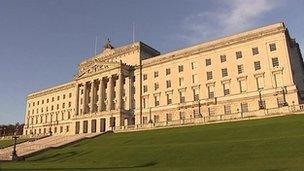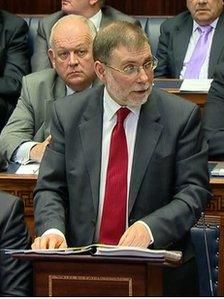Petitions of concern: Is Stormont's safeguard system being abused?
- Published

A petition of concern requires the signatures of at least 30 MLAs to succeed at Stormont
They were designed as a way to safeguard minority rights in Stormont's fledgling power-sharing assembly, but now petitions of concern are themselves becoming a matter of concern.
Former SDLP leader Mark Durkan claims they are now being "played like a joker".
It is one of the kinder descriptions applied to the DUP's decision to use the petition to block an assembly motion this week that, among other things, accused the Social Development Minister Nelson McCausland of misleading the institutions.
An "abuse"; "political chicanery" and "farce" are among the charges made by the DUP's political opponents.
But they are not the only party to have used the mechanism.
'One short'
Sinn Féin tried, and narrowly failed, to use a petition of concern to block Jim Allister's special adviser (Spad) bill in the assembly.
The legislation stops former prisoners with serious convictions becoming a special political adviser at Stormont.
The SDLP's decision not to sign the petition meant Sinn Féin had only the signatures of its 29 MLAs - one short of the 30 required.
The DUP, however, with 38 MLAs, have no such worries and have been using the measure liberally recently to defeat anything from a vote calling for the introduction of gay marriage in Northern Ireland to amendments to the Planning Bill.
Any vote taken by the assembly can be made dependent on cross-community support if a petition of concern is presented to the assembly speaker.
'Veto'
In such cases, a vote on proposed legislation will only pass if supported by a weighted majority (60%) of members voting, including at least 40% of each of the nationalist and unionist designations present and voting.
Effectively this means that, provided enough MLAs from a given community agree, that community can exercise a veto over the assembly's decisions.
Since the restoration of devolution in 1998, the device has been used a total of 63 times - more than half of those were in the past two years.

A motion calling for the assembly to investigate whether Nelson McCausland had misled Stormont was blocked
Unionists, mainly the DUP, have accounted for 37 petitions of concern.
In the most recent assembly term, petitions of concern were used 18 times, compared with just six in 2007/2008, the year devolution was restored.
So what is going on?
According to Mr Durkan, the assembly's standing orders need to be amended to more accurately reflect the 1998 Good Friday Agreement itself, because the measures are being used "as defensive, pre-emptive and prescriptive vetoes".
'Accountability'
The former SDLP leader said: "The petition of concern facility was put into the agreement to safeguard communal sensitivities and specifically to protect equality and human rights considerations.
"It was not proposed or envisaged as a tool to protect any minister from due accountability - not least when there are issues on probity in public finances or propriety of ministerial conduct.
"Paragraphs 11 to 13 of the agreement show that the petition of concern was not meant to be played like a joker, as a reflex veto to frustrate any valid proposal.
"Instead, it was meant to trigger a process whereby equality and human rights concerns could be assessed and addressed, by a specially appointed committee of the assembly taking evidence and reporting on those very issues.
"Unfortunately, the assembly standing orders do not actually reflect the carefully calibrated provision in the agreement itself. The 1998 Act says that the assembly standing orders should make provision for what is laid down in those three paragraphs of the agreement."
'Over-ride'
Mr Durkan added: "I have made the point several times before and do so again that the standing orders need to be corrected in accordance with the agreement and the 1998 Act.
"The argument can also be made, and I made it at the time, that the 1998 Act could have been more explicit in providing for the procedure intended."
The Alliance MP Naomi Long has asked Secretary of State Theresa Villiers to intervene by using the Northern Ireland Miscellaneous Provisions Bill currently making its way through Westminster to instead implement a weighted majority voting system, which would not allow any single party to "over-ride the wishes of the assembly as a whole".

Mark Durkan said the petitions were not envisaged as a tool to protect any minister from accountability
"The petition of concern was designed to offer protection to minorities within the assembly, where decisions of a sensitive nature risked being imposed upon them against their will," Ms Long said.
"Its use in this case to protect the interest of one party in circumstances where there is widespread and cross-community support for a motion is a clear abuse of the mechanism and makes a strong case for urgent reform," she added.
'Outraged'
The DUP rejects the criticism but has said the party is open to change.
A DUP spokesman told the BBC: "The use of a petition of concern in a motion calling for an inquiry that has already been established appears to have caused a greater outcry than when its use blocked an amendment to the Justice Bill, that would have prevented abortions being performed by private clinics.
"Hopefully, those who have apparently been so outraged by the use of a mechanism they negotiated and supported in 1998 will be equally as forthright in their support for reform of the Stormont structures, which the DUP has supported for over a decade now."
Just last week, the cross-party assembly and executive review committee decided "further detailed work" needed to be carried out on petitions of concern.
After the events of this week, many will see that work as more urgent than ever.
Of course, if the DUP, or any other party, does not like any proposed changes they can always block them - with a petition of concern.
- Published8 July 2013
- Published28 May 2013
- Published20 May 2013
- Published12 March 2013